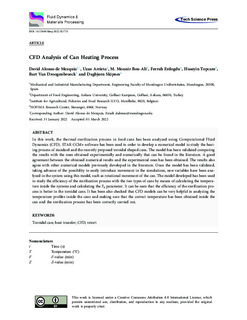| dc.rights.license | Attribution 4.0 International | * |
| dc.contributor.author | Alonso de Mezquia, David | |
| dc.contributor.author | Arrieta Lizarazu, Uxue | |
| dc.contributor.author | Bou-Ali, M. Mounir | |
| dc.contributor.other | Erdogdu, Ferruh | |
| dc.contributor.other | Topcam, Huseyin | |
| dc.contributor.other | Van Droogenbroeck, Bart | |
| dc.contributor.other | Skipnes, Dagbjørn | |
| dc.date.accessioned | 2022-04-11T13:08:34Z | |
| dc.date.available | 2022-04-11T13:08:34Z | |
| dc.date.issued | 2022 | |
| dc.identifier.issn | 1555-256X | en |
| dc.identifier.other | https://katalogoa.mondragon.edu/janium-bin/janium_login_opac.pl?find&ficha_no=167417 | en |
| dc.identifier.uri | https://hdl.handle.net/20.500.11984/5525 | |
| dc.description.abstract | In this work, the thermal sterilization process in food cans has been analyzed using Computational Fluid Dynamics (CFD). STAR CCM+ software has been used in order to develop a numerical model to study the heating process of standard and the recently proposed toroidal shaped cans. The model has been validated comparing the results with the ones obtained experimentally and numerically that can be found in the literature. A good
agreement between the obtained numerical results and the experimental ones has been obtained. The results also agree with other numerical models previously developed in the literature. Once the model has been validated, taking advance of the possibility to easily introduce movement in the simulations, new variables have been analyzed in the system using this model, such as rotational movement of the can. The model developed has been used to study the efficiency of the sterilization process with the two types of cans by means of calculating the temperature inside the systems and calculating the F0 parameter. It can be seen that the efficiency of the sterilization process is better in the toroidal cans. It has been also checked that CFD models can be very helpful in analyzing the temperature profiles inside the cans and making sure that the correct temperature has been obtained inside the can and the sterilization process has been correctly carried out. | en |
| dc.description.sponsorship | Gobierno Vasco | es |
| dc.description.sponsorship | Comisión Europea | es |
| dc.language.iso | eng | en |
| dc.publisher | Tech Science Press | en |
| dc.rights | © 2022 The authors | en |
| dc.rights.uri | http://creativecommons.org/licenses/by/4.0/ | * |
| dc.subject | Toroidal can | en |
| dc.subject | heat transfer | en |
| dc.subject | CFD | en |
| dc.subject | retort | en |
| dc.title | CFD Analysis of can Heating Process | en |
| dcterms.accessRights | http://purl.org/coar/access_right/c_abf2 | en |
| dcterms.source | Fluid Dynamics & Materials Processing | en |
| local.contributor.group | Mecánica de fluidos | es |
| local.description.peerreviewed | true | en |
| local.description.publicationfirstpage | 1129 | en |
| local.description.publicationlastpage | 1136 | en |
| local.identifier.doi | http://dx.doi.org/10.32604/fdmp.2022.021731 | en |
| local.relation.projectID | info:eu-repo/grantAgreement/GV/Elkartek 2021/KK-2021-00082/CAPV/Microtecnologías como motor de desarrollo de Microsistemas avanzados integrados en la Fábrica Inteligente y Digital en el marco de la IIoT4.0/μ4IIOT | en |
| local.relation.projectID | info:eu-repo/grantAgreement/GV/Ikertalde Convocatoria 2022-2025/IT1505-22/CAPV/Mecánica de fluidos/ | en |
| local.relation.projectID | info:eu-repo/grantAgreement/EC/H2020/727473/EU/ERA-Net Cofund on Sustainable Food production and consumption/SUSFOOD2 | en |
| local.contributor.otherinstitution | https://ror.org/01wntqw50 | es |
| local.contributor.otherinstitution | https://ror.org/02v1rsx93 | es |
| local.contributor.otherinstitution | https://ror.org/05cjt1n05 | es |
| local.source.details | Vol.18. No.4. Pp.1129-1136, 2021 | en |
| oaire.format.mimetype | application/pdf | |
| oaire.file | $DSPACE\assetstore | |
| oaire.resourceType | http://purl.org/coar/resource_type/c_6501 | en |
| oaire.version | http://purl.org/coar/version/c_970fb48d4fbd8a85 | en |








